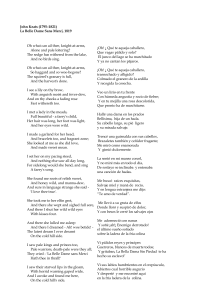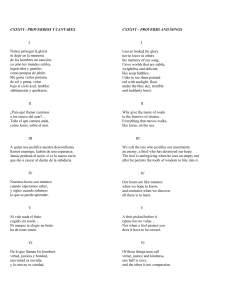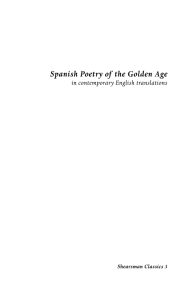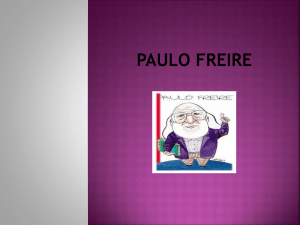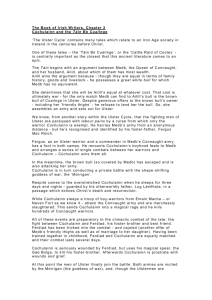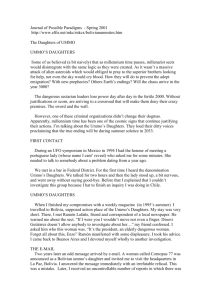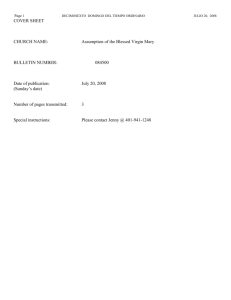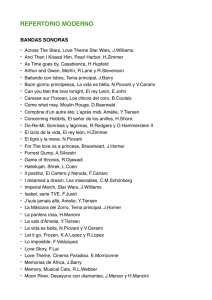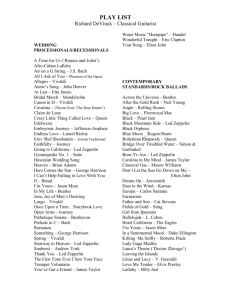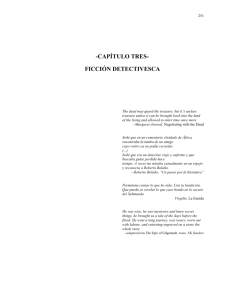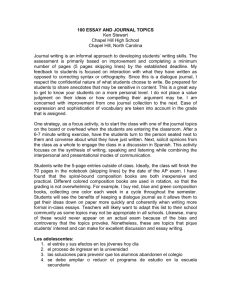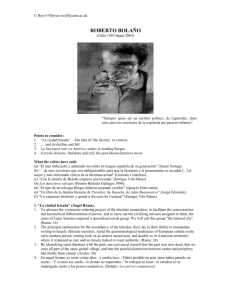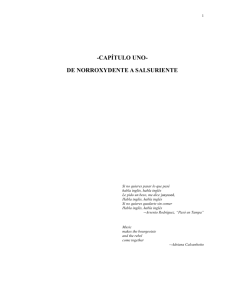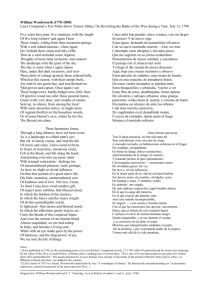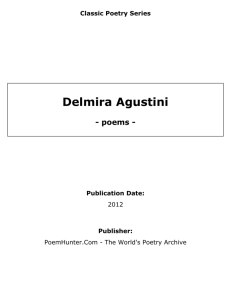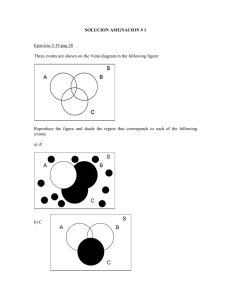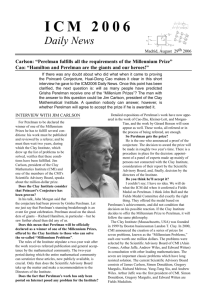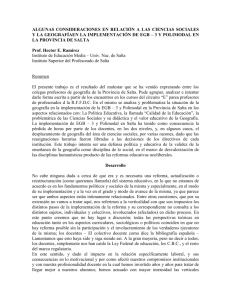GUERRA MANUSCRIPT (The), Vol. 3 8.573312 www.naxos.com
advertisement
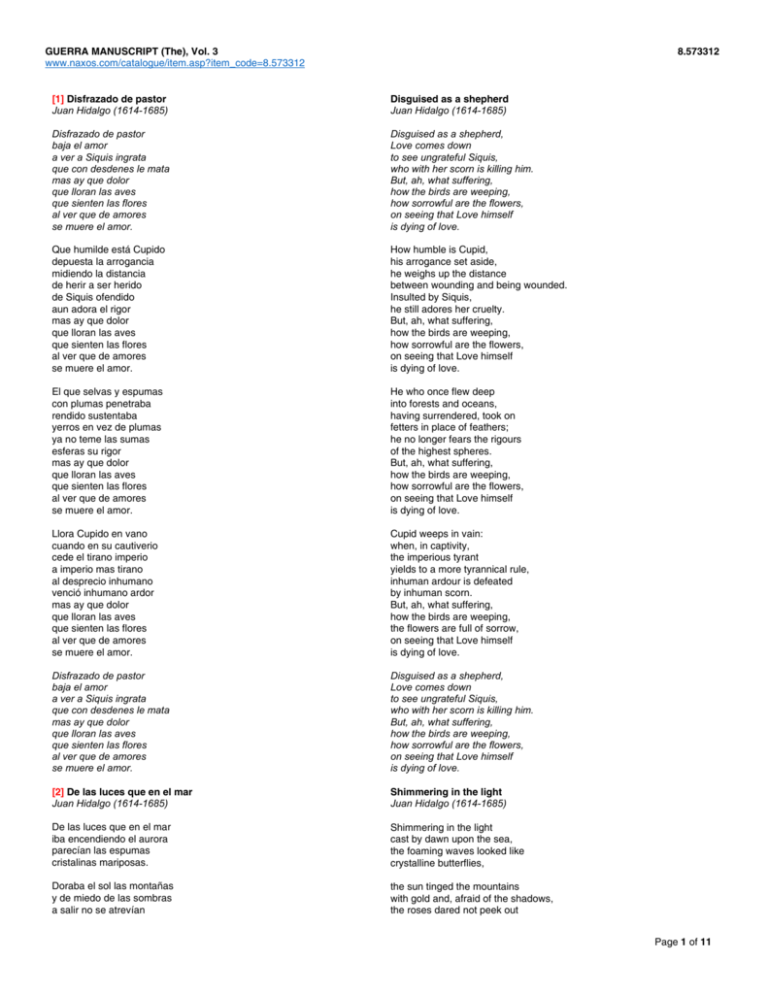
GUERRA MANUSCRIPT (The), Vol. 3 www.naxos.com/catalogue/item.asp?item_code=8.573312 8.573312 [1] Disfrazado de pastor Juan Hidalgo (1614-1685) Disguised as a shepherd Juan Hidalgo (1614-1685) Disfrazado de pastor baja el amor a ver a Siquis ingrata que con desdenes le mata mas ay que dolor que lloran las aves que sienten las flores al ver que de amores se muere el amor. Disguised as a shepherd, Love comes down to see ungrateful Siquis, who with her scorn is killing him. But, ah, what suffering, how the birds are weeping, how sorrowful are the flowers, on seeing that Love himself is dying of love. Que humilde está Cupido depuesta la arrogancia midiendo la distancia de herir a ser herido de Siquis ofendido aun adora el rigor mas ay que dolor que lloran las aves que sienten las flores al ver que de amores se muere el amor. How humble is Cupid, his arrogance set aside, he weighs up the distance between wounding and being wounded. Insulted by Siquis, he still adores her cruelty. But, ah, what suffering, how the birds are weeping, how sorrowful are the flowers, on seeing that Love himself is dying of love. El que selvas y espumas con plumas penetraba rendido sustentaba yerros en vez de plumas ya no teme las sumas esferas su rigor mas ay que dolor que lloran las aves que sienten las flores al ver que de amores se muere el amor. He who once flew deep into forests and oceans, having surrendered, took on fetters in place of feathers; he no longer fears the rigours of the highest spheres. But, ah, what suffering, how the birds are weeping, how sorrowful are the flowers, on seeing that Love himself is dying of love. Llora Cupido en vano cuando en su cautiverio cede el tirano imperio a imperio mas tirano al desprecio inhumano venció inhumano ardor mas ay que dolor que lloran las aves que sienten las flores al ver que de amores se muere el amor. Cupid weeps in vain: when, in captivity, the imperious tyrant yields to a more tyrannical rule, inhuman ardour is defeated by inhuman scorn. But, ah, what suffering, how the birds are weeping, the flowers are full of sorrow, on seeing that Love himself is dying of love. Disfrazado de pastor baja el amor a ver a Siquis ingrata que con desdenes le mata mas ay que dolor que lloran las aves que sienten las flores al ver que de amores se muere el amor. Disguised as a shepherd, Love comes down to see ungrateful Siquis, who with her scorn is killing him. But, ah, what suffering, how the birds are weeping, how sorrowful are the flowers, on seeing that Love himself is dying of love. [2] De las luces que en el mar Juan Hidalgo (1614-1685) Shimmering in the light Juan Hidalgo (1614-1685) De las luces que en el mar iba encendiendo el aurora parecían las espumas cristalinas mariposas. Shimmering in the light cast by dawn upon the sea, the foaming waves looked like crystalline butterflies, Doraba el sol las montañas y de miedo de las sombras a salir no se atrevían the sun tinged the mountains with gold and, afraid of the shadows, the roses dared not peek out Page 1 of 11 GUERRA MANUSCRIPT (The), Vol. 3 www.naxos.com/catalogue/item.asp?item_code=8.573312 8.573312 del verde botón las rosas. from their green buds, Cuando un amante pastor de la ingratitud que adora a suspiros despertaba las mal dormidas memorias. when the sighs of a shepherd in love woke the barely slumbering memories of the ungrateful girl he adores. Ay que desdicha mas ay que lisonja morir de una pena que parece gloria. Alas, what misfortune, but, ah, what flattery, to die of a sorrow that seems such bliss. Por ver el pastor si el día renueva sus ansias locas de Apolo busca las señas en el desdén de una choza. So as to see whether the day will renew his crazed yearnings, the shepherd looks for signs of Apollo in the seclusion of his hut. La música de las aves mas que le alegra le enoja que hacen mayor su desdicha el preciarse de dichosas. The music of the birds angers more than delights him, for their proud happiness does but add to his anguish. Las quejas que entrega al aire le alivian y le congojan que sus pesares le alientan con lo mismo que le ahogan. The lament he utters forth both eases and distresses him for his sorrows spur him on at the same time as drowning him. Ay que desdicha mas ay que lisonja morir de una pena que parece gloria. Alas, what misfortune, but, ah, what flattery, to die of a sorrow that seems such bliss. [3] Al aire, lisonjas Anon. Fly away Anon. Al aire al aire lisonjas de mis verdades pues que sois finezas aun en el aire. Fly away, fly away, my flattering truths, for even upon the breeze you are tender words. Al aire al aire suspiros suspiros al aire al aire que hacéis menos el incendio cuanto os mostráis más cobardes. Fly away, fly away, o sighs, o sighs, fly away, fly away, for you reduce the heat of the flames when you are at your most cowardly. Del duro silencio rompa vuestra actividad la cárcel que es libertad del afecto el dominio de ocultarse. Let your movement break the prison of harsh silence, for love is at liberty to decide how to conceal itself. El fervor que arde sin riesgo mal puede decir que arde que seguridad no tiene quien busca seguridades. Passion that burns without risk can scarce say it burns, for he who seeks certainties no certainty will find. Al aire al aire lisonjas de mis verdades pues que sois finezas aun en el aire. Fly away, fly away, my flattering truths, for even upon the breeze you are tender words. Con lo tímido desluce las razones de que nace porque el arder con fe tibia es ofensa de la imagen. Fire cannot be born shrouded in reticence, for burning with a cool flame does but offend love’s image. Quien el justo sacrificio intenta disfigurarle labra del conocimiento el crédito de ignorante. Anyone discovered trying to harm its rightful sacrifice deserves to be known as a fool. Page 2 of 11 GUERRA MANUSCRIPT (The), Vol. 3 www.naxos.com/catalogue/item.asp?item_code=8.573312 8.573312 Si amor influjo y razón a que adore me persuaden porque ha de ser el acierto donde el error se disfrace. If love, influence and reason persuade me to love, why should error hide behind the disguise of wisdom? Al aire al aire lisonjas de mis verdades pues que sois finezas aun en el aire. Fly away, fly away, my flattering truths, for even upon the breeze you are tender words. [4] Qué dulcemente suena Giovanni Girolamo Kapsperger (c.1580-1651) / José Marín (1619-1699) How sweetly sings Giovanni Girolamo Kapsperger (c.1580-1651) / José Marín (1619-1699) Que dulcemente suena entre esos verdes sauces animada tiorba un ruiseñor envidia de las aves. How sweetly sings among those green willows a nightingale, a living theorbo, envy of the birds. Sus quiebros son suspiros y endechas sus compases que ya en su triste suerte solo el alivio de la queja cabe. Its trills are sighs, its measures are plaints, for all its sad fate now allows it is to ease its sorrow in lamenting. Mira vulgares plumas de estrellas coronarse porque hallaron propicia su condición la vanidad del aire. It sees ordinary feathers being crowned with stars because the conceited air found favour with them. No envidia su fortuna pero siente el ultraje que armado de rigores el torpe olvido a sus blasones hace. It does not envy their fortune but feels the outrage that, armed with rigour, dull oblivion is causing to its honour. En el silencio mudo pasó la mayor parte del siglo de su vida que es de discretos el quejarse tarde. It has spent most of its long life in mute silence, for the timid leave their lamenting late. Ahora que de flores se guarnecen los valles y los arroyos libres rompen del hielo la medrosa cárcel. Now that with flowers the valleys are adorning themselves and the streams are breaking free of their terrifying prison of ice, Ahora que su frente corona de arrayanes aquel monte soberbio en cuyos brazos el aurora nace. now that the high mountain in whose arms daybreak is born is garlanding its brow with myrtles, De la fortuna ahora esperó por mudable verse favorecido y su esperanza marchitó el desaire. it had hoped it might now win the favour of ever-changing fortune, but it has been rebuffed, and so its hopes have faded. Suspende el llanto triste oh ruiseñor suave pues que ya los laureles sólo se crían para los cobardes. Cease your sad weeping, o gentle nightingale, for laurels now are grown only for cowards. [5] La más bella ninfa Anon. The loveliest nymph Anon. La mas bella ninfa deidad soberana envidia del sol lisonja del alba ¿quién será? ¿quién será tan bella zagala? ¿quién será? The loveliest nymph, sovereign deity, envy of the sun, delight of the dawn, who can it be? Who can that loveliest shepherdess be? Who can it be? Page 3 of 11 GUERRA MANUSCRIPT (The), Vol. 3 www.naxos.com/catalogue/item.asp?item_code=8.573312 8.573312 La que a rizos de oro teje su guirnalda rayos con que ilustra su frente nevada ¿quién será? ¿quién será tan bella zagala? ¿quién será? She who weaves into her golden curls sunbeams with which to light her snowy brow. Who can it be? Who can that loveliest shepherdess be? Who can it be? La que con dos arcos cautiva las almas y con dulce imperio lo libre avasalla ¿quién será? ¿quién será tan bella zagala? ¿quién será? She who with two bows does capture hearts and with sweet tyranny does subjugate the free. Who can it be? Who can that loveliest shepherdess be? Who can it be? La que azules ojos su hermosura guardan dando a todos vida cuando a todos matan ¿quién será? ¿quién será tan bella zagala? ¿quién será? She whose blue eyes guard her beauty, giving life to all men, when all men they kill. Who can it be? Who can that loveliest shepherdess be? Who can it be? La que en sus mejillas al abril da vaya y el mayo sus flores la ha dicho en su cara ¿quién será? ¿quién será tan bella zagala? ¿quién será? She whose cheeks make a mockery of April, and whose face is full of May flowers. Who can it be? Who can that loveliest shepherdess be? Who can it be? La que en breve golfo riquezas embarca coral en sus labios y en su frente nácar ¿quién será? ¿quién será tan bella zagala? ¿quién será? She who finds treasure in the shallows, coral for her lips, mother-of-pearl for her brow. Who can it be? Who can that loveliest shepherdess be? Who can it be? La que a la azucena mano a mano saca y en cándido duelo la lleva ventaja ¿quién será? ¿quién será tan bella zagala? ¿quién será? She who picks the Madonna lily with her own hands and outdoes it for snow-white purity, who can it be? Who can that loveliest shepherdess be? Who can it be? Si no es Amarilis la de señas tantas pues sola ella tiene belleza sobrada ¿quién será? ¿quién será tan bella zagala? ¿quién será? If ’tis not Amaryllis, blessed with so many virtues, for she alone has beauty to spare, who can it be? Who can that loveliest shepherdess be? Who can it be? [6] Sólo es querer Juan Hidalgo (1614-1685) Love is naught Juan Hidalgo (1614-1685) Sólo es querer, penar, morir, arder, callar, no merecer y el tormento adorar. Ay que muero, que vivo, que anhelo, por el dulce vivir de que me muero. Love is naught but longing, suffering, dying, burning, staying silent, being unworthy yet adoring the torment. Ah, how I die, how I live, how I yearn for the sweet life that will be my death. Page 4 of 11 GUERRA MANUSCRIPT (The), Vol. 3 www.naxos.com/catalogue/item.asp?item_code=8.573312 8.573312 Con tanto respecto adoran mis retirados afectos que el propio dolor me asusta por ruido y no por tormento. So respectful is the love of my muted affections that my anguish does frighten me with the sound it makes, not the pain it causes. Callo, peno y no respiro y es que si respiro temo que aun lo que aliento postrado es ofensa del silencio. I suffer in silence and breathe not, for if I breathe I fear that even as I sleep my exhalations do offend the silence. Hasta el corazón suspende todo el vital movimiento porque su rumor no sienta la imagen que está en el pecho. My heart too does suspend all its vital movement that its sound be not heard by the image within my breast. Creyendo ofender no adoro lo sagrado del objeto solamente soy de aquella razón de lo que padezco. Believing I offend, I worship not the sacredness of the object, I simply put myself in the hands of the cause of my suffering. De amor el mayor milagro en mi humilde ser contemplo pues se alimenta la vida de lo que se va muriendo. I observe love’s greatest miracle in my humble self, for life nurtures itself on that from which it is slowly dying. Sólo es querer, penar, morir, arder, callar, no merecer y el tormento adorar. Ay que muero, que vivo, que anhelo, por el dulce vivir de que me muero. Love is naught but longing, suffering, dying, burning, staying silent, being unworthy yet adoring the torment. Ah, how I die, how I live, how I yearn for the sweet life that will be my death. [7] Ayer, zagales, bajé Anon. Yesterday, lads, I went down Anon. Ayer zagales bajé al soto de Mazanares por si templaba mi amor las llamas con los cristales. Yesterday, lads, I went down to the apple orchard to see if the flames of my love could be cooled by the stream. Pero estaba en él Gileta del sol bellísimo ultraje con que halló mi vida riesgos en vez de seguridades. But Gileta was there, that loveliest insult to the sun, and so my life has found danger instead of safety. Una carroza de nácar fue de su aurora el celaje que avara de sus reflejos los oculta y los esparce. A mother-of-pearl carriage had veiled in clouds the dawn which, miserly with her reflections, does hide and scatter them. Y aunque muero de mirar sus perfecciones constante pluguiese amor fuesen días del soto todas las tardes. And although I die from gazing constantly on her perfections, would that it pleased love that every day could be spent in the orchard. Mis humildes pensamientos favoreció con mirarme que es fullería en sus ojos dar vida para que maten. She favoured my humble thoughts by looking upon me, for it is the trick of her eyes to give life so that they kill. Mas ay que dolor mas ay que desdicha que Gileta me mata por darme vida. But ah, what sorrow, but ah, what distress, for Gileta is killing me by giving me life. Page 5 of 11 GUERRA MANUSCRIPT (The), Vol. 3 www.naxos.com/catalogue/item.asp?item_code=8.573312 8.573312 [8] Pues así mis cuidados José Marín (1619-1699) And thus an icy scorn José Marín (1619-1699) Pues así mis cuidados del hielo de un desdén están temblando. And thus an icy scorn has set my cares to trembling. De los ceños de Diciembre que temeroso está el campo y del susto los arroyos parece que se han helado. How afraid the fields are of December’s frown! And it seems the streams are frozen in terror. como conocen las selvas de su rigor el estrago con cualquier soplo del viento las hojas están temblando. How well the forests know its harsh destructive power, with every breath of wind their leaves do tremble. Para defensa del día llaman las aves los rayos mas tartamudas del frío madrugan al sol despacio. To mount a defence of the day, the birds summon rays of light, but, stuttering with the cold, they are slow to waken the sun. En vez de rocas y flores escarcha llevan los prados blanca injuria de la verde esperanza del verano. Instead of pebbles and flowers, the meadows are clothed in frost, a white insult to the green hopes of summer. De los ecos envidiosos que son voz de los peñascos a bramidos habla el viento mas recio mas no tan claro. Of the envious echoes that are the voice of the crags the wind speaks in a roar, more loudly but not as clearly. De las montaraces fieras no son las cumbres amparo que en la saña de la nieve cada copo es un venablo. The peaks are no refuge for the wild beasts, for amid a cruel snowstorm every flake is a dart. Pues así mis cuidados del hielo de un desdén están temblando. And thus an icy scorn has set my cares to trembling. [9] Filis, no cantes José Marín (1619-1699) Phyllis, do not sing José Marín (1619-1699) Filis no cantes disfrazando rigores con suavidades. Phyllis, do not sing and thus mask your cruelty in sweet gentleness. Tan sonoras tiranías esa breve flor esparce que son violencias acordes hasta sus ecos fragantes. Such sonorous tyrannies does that short-lived flower scatter that even its fragrant echoes are harmonious acts of violence. Nunca tus luceros miro sin que sus arcos disparen como flechas invisibles armonías penetrantes. Never do I see your eyes without their bows firing off harmonies that penetrate like invisible arrows. Yo bien sé que de tus ojos es el movimiento grave muda emulación canora de los orbes celestiales. I know well that your eyes do solemnly move in hushed but tuneful emulation of the celestial spheres. Sobra la voz al concepto pues de tu silencio nacen cláusulas que el alma entiende términos que ignora el arte. Your voice is not needed here, since your silence utters phrases that the soul understands, words beyond art. Corre un velo a tantas luces en proporción de lo frágil Draw a veil over such bright lights, wary of their fragility; Page 6 of 11 GUERRA MANUSCRIPT (The), Vol. 3 www.naxos.com/catalogue/item.asp?item_code=8.573312 8.573312 no mires con tanto imperio y si has de mirar no cantes. look not with such imperiousness, and if you must look, sing not. Filis no cantes disfrazando rigores con suavidades. Phyllis, do not sing and thus mask your cruelty in sweet gentleness. [10] Van y vienen mis pensamientos José Marín (1619-1699) My thoughts come and go José Marín (1619-1699) Van y vienen mis pensamientos como las olas del mar mi pena con los que vienen mi bien con los que se van. My thoughts come and go like the waves of the sea, my suffering with those coming in, my wellbeing with those going out. De mi pensamiento lloro la crueldad pues me lleva el bien y me deja el mal. I weep for the cruelty of my mind, since it robs me of the good and leaves me with the bad. Que ha de hacer un triste para descansar si en traje de alivio encuentra el pesar. What must a poor wretch do to find rest if he finds sorrow dressed up as consolation. Siempre el desengaño ha sido leal y si a mi me busca me viene a engañar. Disillusion has always remained loyal, and if it seeks me out, comes to deceive me. Van y vienen mis pensamientos como las olas del mar mi pena con los que vienen mi bien con los que se van. My thoughts come and go like the waves of the sea, my suffering with those coming in, my wellbeing with those going out. Las olas que advierto de puro cristal el veneno esconden en su claridad. The crystal-clear waves I see hide poison in their clarity. Si las aguas fingen quien ha de esperar de los pensamientos oculta verdad. If the water can feign, who can hope to read a mind’s hidden truth? Cadena de engaños es prisión fatal ruego al escarmiento me de libertad. A chain of betrayals is a fatal prison, I beg this punishment to set me free. Van y vienen mis pensamientos como las olas del mar mi pena con los que vienen mi bien con los que se van. My thoughts come and go like the waves of the sea, my suffering with those coming in, my wellbeing with those going out. [11] No lloréis, mi Celia Anon. Weep not my Celia Anon. No lloréis mi Celia no lloréis mi amor que tan lindas perlas nadie las vertió. Weep not, my Celia, weep not, my love, for no one has shed such beautiful pearls. Aunque el alba sois bella Celia mía tanta perlería no merece el sol sirena del día templad el favor que tan lindas perlas Although you are the dawn, fair Celia mine, the sun does not deserve such an array of pearls; siren of the day, temper your favour, for no one has shed Page 7 of 11 GUERRA MANUSCRIPT (The), Vol. 3 www.naxos.com/catalogue/item.asp?item_code=8.573312 8.573312 nadie las vertió. such beautiful pearls. Que altivo pesar se pudo atrever a descomponer tan supremo albor cesad por mi vida si la vuestra soy que tan lindas perlas nadie las vertió. What proud sorrow could have dared disturb such a fair dawn? Ah, stop, on my life, if I am yours, for no one has shed such beautiful pearls. Son muy fugitivas si llego a cogerlas osaré volverlas siendo ya mas mías volvedlas al nácar de mi corazón que tan lindas perlas nadie las vertió. They are so hard to grasp, if I manage to catch them I shall dare return them, they being now more rightly mine, ah, return them to my heart of mother-of-pearl, for no one has shed such beautiful pearls. Nunca tuvo oriente en su mar undoso caudal mas precioso que el yo presente si queréis que viva no se aumente no que tan lindas perlas nadie las vertió. Never did the east contain water more precious in its billowing seas than I have here; if you want me to live, let its level rise no higher, no, for no one has shed such beautiful pearls. No lloréis mi Celia no lloréis mi amor que tan lindas perlas nadie las vertió. Weep not, my Celia, weep not, my love, for no one has shed such beautiful pearls. [12] Ojos para el llanto Anon. Eyes designed to weep Anon. Ojos para el llanto prevenid paciencia si hay para una ausencia ojos para el llanto. Eyes designed to weep, make room for patience if over an absence there are eyes designed to weep. La lengua del agua vuestro pesar cuente que es muy elocuente la lengua del agua. Let the water’s tongue tell of your sorrow, for ’tis so very eloquent, the water’s tongue. La lengua enmudece pero hable mi amor porque habla mejor la lengua enmudece. That tongue is weary but let my love speak for it speaks better, that tongue is weary. De la prisión del pecho desasidos salid tristes gemidos y en estas soledades segura habitación de las verdades el mal de mis enojos se anegue con la lluvia de mis ojos. From the prison of my breast, issue forth, unbound, o sad laments and in this solitary place, safe home of truths, let the pain of my troubles be drowned in the rain of my tears. Amante y ausente peno en dulce calma pero es tuya el alma amante y ausente. Loving and absent, I suffer in quiet calm, but ’tis yours, my soul so loving and absent. La luz de mis ojos perdió su esplendor que cegó el amor la luz de mis ojos. The light of my eyes has lost its shine, for love has dimmed the light of my eyes. Page 8 of 11 GUERRA MANUSCRIPT (The), Vol. 3 www.naxos.com/catalogue/item.asp?item_code=8.573312 8.573312 Aqueste tormento martirio es del alma pues nunca está en calma aqueste tormento. This torment is torture to my soul for ’tis never at peace, this torment. En tan dulce encanto vivo lo que lloro y mi hechizo adoro en tan dulce encanto. In such sweet enchantment I am sustained by that for which I weep, and I worship the spell that binds me in such sweet enchantment. De la prisión del pecho desasidos salid tristes gemidos y en estas soledades segura habitación de las verdades el mal de mis enojos se anegue con la lluvia de mis ojos. From the prison of my breast, issue forth, unbound, o sad laments and in this solitary place, safe home of truths, let the pain of my troubles be drowned in the rain of my tears. [13] Vuelve, Amarilis divina Anon. Return, divine Amaryllis Anon. Vuelve Amarilis divina vuelve a la campaña adonde solo en señal de que mueren ámbar expiran las flores. Return, divine Amaryllis, return to the meadows in which the flowers give off amber as a sign that they are dying. Vuelva tu luz a dar vida con una muerte tan noble que hace feliz el estrago adonde viven los hombres. Let your light return to bring life with a death so noble that it cheers the destruction amid which mortals live. Y si es piedad el retiro te engañas pues bien conoces que para cebar tus iras te llevas los corazones. And you are fooling yourself if you think that your leaving is a sign of mercy, for you know well that to feed your anger you steal our hearts away. En traje de blando alivio se fulminan tus rigores como si hubiera defensa para tus dulces arpones. Disguised as tender consolation, your cruelty thunders forth as if there were any defence against your gentle spears. Mas ay que algún accidente de nuevo rigor dispone que las tinieblas abrasen a quien cegaron los soles. But, ah, some accident of new rigour decrees that the darkness should burn one blinded by the suns. Si rayos el sol concibe cuando a la vista se esconde sin duda que estás enferma de achaque de resplandores. If the sun’s rays still shine when it hides from sight, you must be suffering from an ailment of the light. Al aire Amarilis vuelan conformes mis voces y suspiros mas ay que son del viento suspiros y voces. Into the air, Amaryllis, thus do fly my words and sighs, but alas, words and sighs belong to the breeze. [14] Desmayado el aliento Juan del Vado (c.1625-1691) Short of breath Juan del Vado (c.1625-1691) Desmayado el aliento y a su dolor rendido se queja un corazón de amor herido. Short of breath, and yielding to its pain, a heart wounded by love does lament. Un corazón amante que desprecia el aviso padezca, gima y llore, A loving heart that scorns counsel, let it suffer, groan and weep, Page 9 of 11 GUERRA MANUSCRIPT (The), Vol. 3 www.naxos.com/catalogue/item.asp?item_code=8.573312 8.573312 quéjese de sí mismo. let it protest about itself. Nadie ignora que amor tiene con artificio las finezas con alas los pesares con grillos. No one is unaware that love by its artifice fits kindness with wings, sorrows with chains. No espere ya remedio quien herró el sacrificio porque Cúpido es falso muy preciado de fino. Let one who failed the sacrifice no longer hope for escape for Cupid is false, his cunning highly valued. Éste es aquel que sabe hacer fuego atractivo y convertirlo en nieve para mayor desvío. He is the one who knows how to make an alluring fire and turn it to snow just to cause greater dismay. Viva de lo que muere quien no espera otro alivio o ruegue al desengaño le mude a otro destino. Let he who cannot hope for other release live from that which kills, or beg disillusionment to alter his destiny. Desmayado el aliento y a su dolor rendido se queja un corazón de amor herido. Short of breath, and yielding to its pain, a heart wounded by love does lament. [15] Una niña pregonó Anon. A girl did proclaim Anon. Una niña pregonó que se perdió y por hallarla anda perdido mi amor, oigan el pregón porque si ella se pierde me pierdo yo. A girl did proclaim that she was lost and as it wanders in search of her my love too is lost. Listen to her proclamation, for if she is lost, I am lost too. En san Elifonso el sol me salió y en la misma parte se me puso el sol, oigan el pregón porque si ella se pierde me pierdo yo. On St Alphonsus’ day, the sun rose above me and set again in the same place. Listen to her proclamation, for if she is lost, I am lost too. Llámase deidad la más superior pues en su hermosura es un rayo el sol, oigan el pregón porque si ella se pierde me pierdo yo. Call upon the highest deity, for in the light of her beauty the sun is but a ray. Listen to her proclamation, for if she is lost, I am lost too. Cortesanos valientes sus dos ojos son porque matan y andan de luto los dos, oigan el pregón porque si ella se pierde me pierdo yo. Her two eyes are brave courtiers because they kill and then do mourn. Listen to her proclamation, for if she is lost, I am lost too. El concepto apela a la discreción pues de sus cabellos traigo el oro yo, oigan el pregón porque si ella se pierde me pierdo yo. This matter requires discretion for I have the gold of her hair. Listen to her proclamation, for if she is lost, I am lost too. Page 10 of 11 GUERRA MANUSCRIPT (The), Vol. 3 www.naxos.com/catalogue/item.asp?item_code=8.573312 8.573312 Entre sus mejillas vi que se asomó la rosa y por eso conocí la flor, oigan el pregón porque si ella se pierde me pierdo yo. Upon her cheek I saw a rosy blush appear and thus did recognise the flower. Listen to her proclamation, for if she is lost, I am lost too. La nieve a sus manos quiso imitación diéronla de mano y helada quedó, oigan el pregón porque si ella se pierde me pierdo yo. She wanted her hands to be compared to snow; it was place in her hands and she was frozen. Listen to her proclamation, for if she is lost, I am lost too. Pies de maravilla hoy sus plantas son pues sin tener punto son de estimación, oigan el pregón porque si ella se pierde me pierdo yo. Marvellous to behold now are her feet; even though beyond compare, they are to be praised. Listen to her proclamation, for if she is lost, I am lost too. Esta es su hermosura porque bien sé yo que por estas señas no se oculte, no, oigan el pregón porque si ella se pierde me pierdo yo. This beauty is hers: from all these clues I know it full well, let her not hide, no. Listen to her proclamation, for if she is lost, I am lost too. Page 11 of 11
